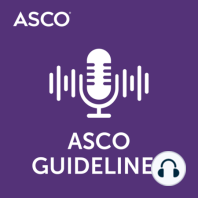27 min listen
Human Papillomavirus Testing in Head and Neck Carcinomas Endorsement Guideline
FromASCO Guidelines
ratings:
Length:
7 minutes
Released:
Sep 6, 2018
Format:
Podcast episode
Description
An interview with Dr. Carole Fakhry from Johns Hopkins School of Medicine on the ASCO endorsement of the CAP guideline on human papillomavirus (HPV) testing in head and neck carcinomas. Read the full guideline at www.asco.org/head-neck-cancer-guidelines The purpose of this podcast is to educate and to inform. This is not a substitute for professional medical care, and is not intended for use in the diagnosis or treatment of individual conditions. Guests on this podcast express their own opinions, experience, and conclusions. The mention of any product, service, organization, activity, or therapy should not be construed as an ASCO endorsement. Hello, and welcome to the ASCO Guidelines podcast series. My name is Shannon McKernin, and today I'm interviewing Dr. Carole Fakhry from Johns Hopkins School of Medicine, lead author on Human Papillomavirus Testing in Head and Neck Carcinomas: ASCO Clinical Practice Guideline Endorsement of the CAP Guideline. Thank you for being here today, Dr. Fakhry. Thanks for having me. So first, can you give us a general overview of what this guideline covers? Sure. This guideline serves to guide multi-disciplinary clinicians in the evaluation of head and neck cancers. And it really starts to clarify which HPV tests to order and when. Also discusses some of the imitations of using surrogate HPV testing in specific situations. The College of American Pathology Guidelines were recently published and we are providing an endorsement with certain classifications and discussions of nuances that we as a committee felt were important and clinically significant, specifically, aspects that could alter clinical care. So what are the key recommendations of this guideline? So first and foremost, the key recommendation is that HPV tumor detection should be performed in oropharynx tumors and not for non-oropharynx tumors. An important aspect of that is that HPV tumor testing should not be altered based on sex, race, age, or smoking history. Another important recommendation is that the term "high-risk" only be used when HPV-specific testing is performed. That would establish the tumor is ideologically related to the infection human papillomavirus. In the absence of HPV-specific testing, we recommend that the term HPV-related tumors be used, and that p16 deserving for oropharynx tumors only. And can you tell us a little bit about the qualifying statements made on some of these recommendations, and why the expert panel decided to include these? Sure. So one of the qualifying statements that we did make was a generalized one, and the one that I kind of just touched upon, that the term "high-risk HPV" should only be used in situations when HPV-specific testing was performed. And that's because sometimes things are p16 positive but not necessarily HPV-related or etiologically related to the infections. So as a committee, we wanted to make sure that that was clear. In light of that, one of the recommendations from the CAP Guidelines was that for tissue specimens presenting with medistatic squamma cell carcinoma of unknown primary and cervical upper, or mid-jugular, chain lymph nodes, pathologists should perform p16 in situ hybridisation. They also had added a note saying that additional high-risk HPV testing on p16-positive cases should be performed for tumors located outside of level two or three in the neck, and/or for tumors with keratinizing morphology. So in the qualifying statement, our committee felt that p16 immunohistochemistry alone was not sufficient in the scenario of an unknown primary cancer. We can get false positives and tumors that are p16-positive but not related to HPV. Can arise in situations of metastasis from the skin cancers, salivary gland malignancies, or even lung primaries. Therefore, in the case of an unknown primary, we would recommend HPV-specific testing. What other important consideration that our committee felt was important to clarify was that in the unknown primary, whether or not a tumo
Released:
Sep 6, 2018
Format:
Podcast episode
Titles in the series (100)
Practical Assessment and Management of Vulnerabilities in Older Patients Guideline: An interview with Dr. Supriya Mohile from University of Rochester on the guideline published in JCO which provides guidance regarding the practical assessment and management of vulnerabilities in older patients undergoing chemotherapy. To read... by ASCO Guidelines
